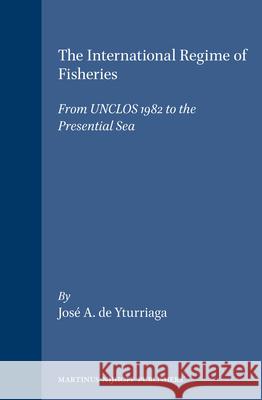The International Regime of Fisheries: From Unclos 1982 to the Presential Sea » książka
The International Regime of Fisheries: From Unclos 1982 to the Presential Sea
ISBN-13: 9789041103659 / Angielski / Twarda / 1997 / 344 str.
The International Regime of Fisheries: From Unclos 1982 to the Presential Sea
ISBN-13: 9789041103659 / Angielski / Twarda / 1997 / 344 str.
(netto: 969,50 VAT: 5%)
Najniższa cena z 30 dni: 1017,98
ok. 30 dni roboczych
Bez gwarancji dostawy przed świętami
Darmowa dostawa!
Until recently, the international community failed to adopt either an agreed limit for the breadth of the territorial sea or a satisfactory regime of fisheries in the waters adjacent to the territorial sea. This provoked an eruption of unilateral acts by which coastal states extended their jurisdiction towards the high seas. The Third U.N. Conference on the Law of the Sea accepted the establishment of a 12-mile territorial sea and a 200-mile exclusive economic zone.
While taking into account the non-existent rights and interests of the so-called geographically disadvantaged states and of states with broad continental shelves, the 1982 Convention on the Law of the Sea practically ignored existing rights and interests of habitual fishing states. It maintained the well-established principle of freedom of fishing on the high seas but with specific conditions.
Dissatisfied with the Convention's regulation of fishing on the high seas, a few states elected to hold a U.N. Conference on Straddling and Highly Migratory Fish Stocks which adopted the 1995 Agreement for the implementation of the provisions of the Convention relating to the conservation and management of such stocks. Similarly, some of these states, like Chile, Argentina, and Canada, adopted legislation extending their jurisdiction beyond their respective 200-mile fishing or exclusive economic zones.
This book explores these events in the historical development of the international regulations of fisheries and concludes with a look into recent developments in the area.











